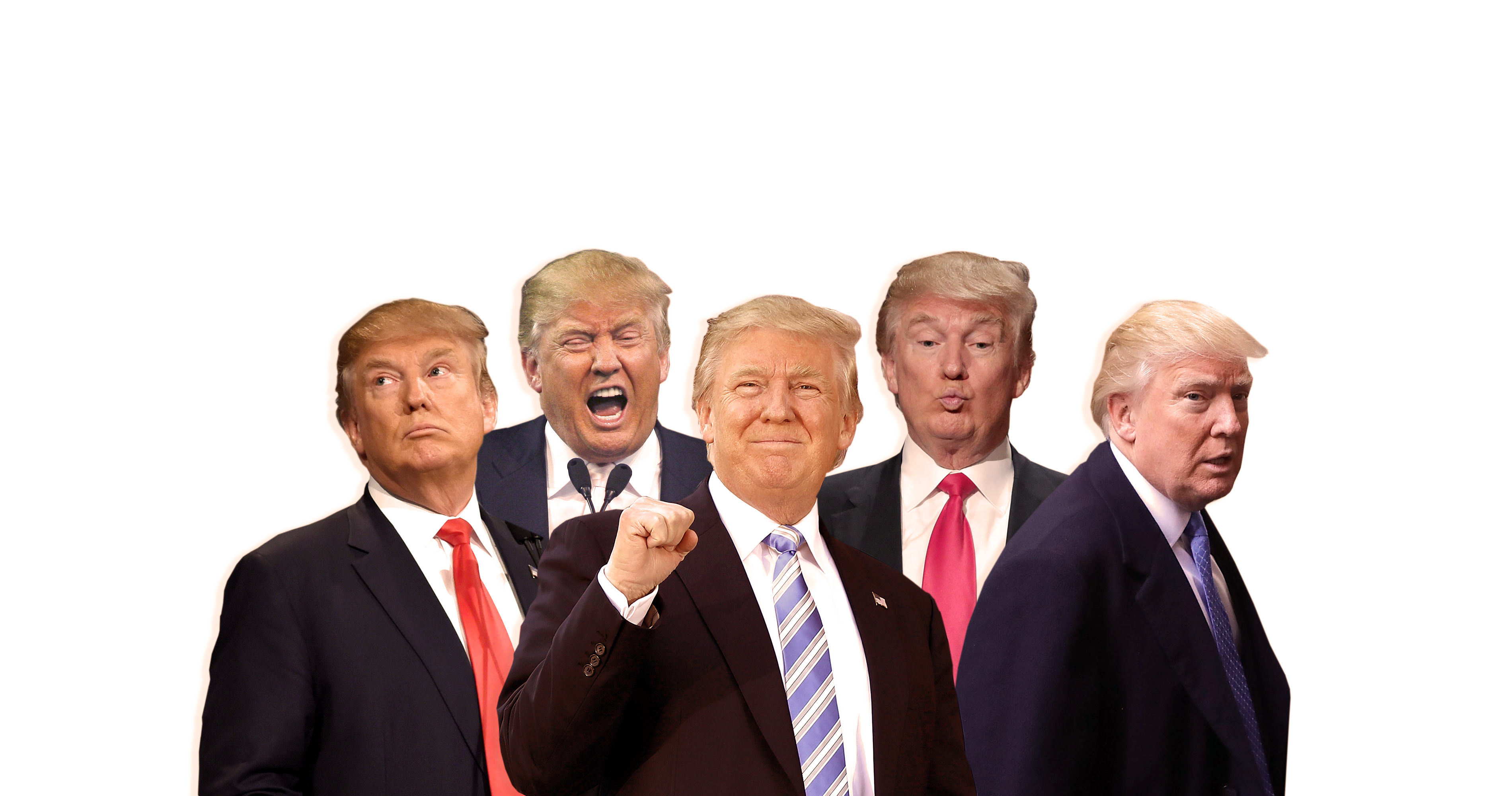What will Donald Trump's presidency be like? Here are 5 scenarios.
America is left with a genuinely mysterious question: How will President Donald Trump govern? Here are a few very real possibilities.


A free daily email with the biggest news stories of the day – and the best features from TheWeek.com
You are now subscribed
Your newsletter sign-up was successful
1. The Northeastern moderate
Before he discovered birtherism, Trump gave every indication that he was a finger-wetting, wind-direction-checking, big-city Northeastern moderate. In 1999, he described himself as "very pro-choice." As recently as December 2012, he had urged the Republican Party, still licking its wounds over the re-election of President Obama, to get ahead of the immigration issue and win over Hispanic voters with comprehensive reform. Even during the 2016 GOP primaries, he signaled a break from the Republican mainstream by vowing to protect Medicare and Social Security.
Maybe President Trump will govern like his old self.
The Week
Escape your echo chamber. Get the facts behind the news, plus analysis from multiple perspectives.

Sign up for The Week's Free Newsletters
From our morning news briefing to a weekly Good News Newsletter, get the best of The Week delivered directly to your inbox.
From our morning news briefing to a weekly Good News Newsletter, get the best of The Week delivered directly to your inbox.
Throughout his public life, Trump has maintained a hard-line posture on law-and-order issues. But that's a posture common to New York/New Jersey moderates like Rudy Giuliani and Chris Christie, who, not surprisingly, were among Trump's earliest boosters.
Trump has also been a persistent critic of small-l liberal trade orthodoxy. In this 1988 appearance on Late Night With David Letterman, in which he presaged every major theme of his successful presidential campaign ("Do you want to see the United States become a winner, David?"), he complained about trade deficits with Japan ("They dump the cars and the VCRs and everything else") as well as the U.S. guarantee of the island nation's security ("We defend Japan for virtually nothing, which is hard to believe").
In light of this, it's possible that all the race-baiting of the 2016 campaign, all the bluster about Mexicans and Muslims, was a crude but necessary ploy to dislodge the Republican base from its fealty to the economic libertarianism of the party establishment in Washington. To get downscale Republican voters to finally vote in their material self-interest, he had to appeal to their basest cultural instincts.
As president, Trump might well prove to be a pragmatic dealmaker. He owes nothing to the Republican congressional leadership. If anything, they owe him for their astonishing good fortune. Consequently, Trump could be as willing to cut deals with Democratic leaders Chuck Schumer and Nancy Pelosi as he is with GOP leaders Paul Ryan and Mitch McConnell.
A free daily email with the biggest news stories of the day – and the best features from TheWeek.com
In this scenario, a clear truth will materialize: It took a brazen figure like Donald Trump to break the partisan logjam in Washington.
2. The president of pomp
Judging from the incoherent, often downright juvenile way in which Trump spoke about policy, it's safe to say he knows virtually nothing about virtually everything. The Trump campaign reportedly tried to entice Ohio Gov. John Kasich to join the ticket by promising that he'd be in charge of both domestic and foreign policy — leaving the vaguely momentous job of "making America great again" to the president.
What if Trump does not want to be bothered with the details of day-to-day governance and international relations? As long as he gets the credit for the legislation he signs into law; as long as it's known that he is vested with final authority; as long as he is the "decider," he will not sweat the details of public policy or diplomacy.
Under this scenario, the Trump administration's policy agenda will be farmed out to Vice President Mike Pence (a right-wing conservative in good standing with the movement) and congressional leaders McConnell and Ryan. President Trump will essentially rubber-stamp into law a massive tax cut for the wealthy, the partial privatization of Medicare, the block-granting of Medicaid, plus the repeal of ObamaCare and Dodd-Frank financial-industry regulations.
3. The people pleaser
Donald Trump has a deeply felt need for people to like him, to be "nice" to him. As a result, during the campaign he found himself on every side of every issue, often inside the same sentence. It was difficult to keep track of the evolution of his policy positions. (You can peruse an attempt to do so here.)
Trump may well try to govern every which way, in the same way he campaigned every which way. We will get a border wall. Or a fence. Or an "electronic fence." It will be big and beautiful … and porous … and virtual. And he will countenance a path to citizenship for millions of undocumented "terrific people," after having made a show of deporting criminals in no greater number than the Obama administration.
He will repeal ObamaCare. But not really. Or not immediately. Maybe never. Those with preexisting conditions will still have insurance and the 26-and-under cohort will be able to stay on their parents' plans. No one will lose coverage and he will maintain the consumer protections of the Affordable Care Act. He'll call the whole thing "TrumpCare" and declare victory for freedom.
He will cut taxes and make up for the shortfall in revenue by … making American revenue great again. That is, he will deficit-finance his tax cuts in the same fashion as Presidents Reagan and Bush 43.
When faced with a tough choice or politically painful trade-off, he will not choose at all. He will be all things to all people.
4. The pernicious president
The premise of Trump's campaign was that pluralism has failed. Pluralism has made us less safe. Political correctness has made it impossible to utter the truth. And the law-abiding white Christian majority in this country is under siege from multiculturalists, Islamists, and globalists.
With the installment of Steve Bannon as a top White House strategist and the appointment of Gen. Michael Flynn and Sen. Jeff Sessions as national security adviser and attorney general, respectively, Trump may well intend to run an administration every bit as uncompromising as his most vitriolic campaign rhetoric. We will get a border wall and a ban on travel from Muslim-majority countries. The Trump administration will further gut the Voting Rights Act and make it yet harder for minorities to cast a ballot. Otherwise law-abiding undocumented workers and their families will live in a climate of fear, always looking over their shoulder.
Further, it will become clear that Trump wasn't bluffing when he threatened to "open up" libel law to combat unfair attacks in the press and initiate antitrust action against Washington Post owner Jeff Bezos. He will persecute unfriendly media and opponents in the business world via the vast regulatory power of the executive branch of government.
5. The agent of chaos
What if none of these scenarios entirely comes to pass — but instead, all of them do to one extent or another? Maybe we'll see a partial realization of and a bleeding between each scenario. It will all depend on who has the president's ear at any given moment — on who was the last operative to stroke his ego and seduce his narcissism. The incoherent nonsense that issues from his mouth will result in "red line"-like international confusion on a monthly basis, or worse. Our allies will never be sure if Trump can be trusted, if the intelligence we share with them isn't already known to geopolitical rivals like Russia.
And all the while, Trump and his family will enrich themselves. The line between the Trump Organization and the Trump administration will be blurry at best, nonexistent at worst. The Trumps will coopt the federal bureaucracy to ensure favorable regulation of their business interests. Authoritarian governments around the world will curry favor with Trump by laundering money through his network of international business contacts.
Terrifying, right? Well, I'm sorry to tell you that it's all too possible. And this is why America urgently needs to formalize an Independents Against Trump movement — the subject of my next column. Stay tuned.
Scott Galupo is a freelance writer living in Virginia. In addition to The Week, he blogs for U.S. News and reviews live music for The Washington Post. He was formerly a senior contributor to the American Conservative and staff writer for The Washington Times. He was also an aide to Rep. John Boehner. He lives with his wife and two children and writes about politics to support his guitar habit.
-
 Political cartoons for February 3
Political cartoons for February 3Cartoons Tuesday’s political cartoons include empty seats, the worst of the worst of bunnies, and more
-
 Trump’s Kennedy Center closure plan draws ire
Trump’s Kennedy Center closure plan draws ireSpeed Read Trump said he will close the center for two years for ‘renovations’
-
 Trump's ‘weaponization czar’ demoted at DOJ
Trump's ‘weaponization czar’ demoted at DOJSpeed Read Ed Martin lost his title as assistant attorney general
-
 The billionaires’ wealth tax: a catastrophe for California?
The billionaires’ wealth tax: a catastrophe for California?Talking Point Peter Thiel and Larry Page preparing to change state residency
-
 Bari Weiss’ ‘60 Minutes’ scandal is about more than one report
Bari Weiss’ ‘60 Minutes’ scandal is about more than one reportIN THE SPOTLIGHT By blocking an approved segment on a controversial prison holding US deportees in El Salvador, the editor-in-chief of CBS News has become the main story
-
 Has Zohran Mamdani shown the Democrats how to win again?
Has Zohran Mamdani shown the Democrats how to win again?Today’s Big Question New York City mayoral election touted as victory for left-wing populists but moderate centrist wins elsewhere present more complex path for Democratic Party
-
 Millions turn out for anti-Trump ‘No Kings’ rallies
Millions turn out for anti-Trump ‘No Kings’ ralliesSpeed Read An estimated 7 million people participated, 2 million more than at the first ‘No Kings’ protest in June
-
 Ghislaine Maxwell: angling for a Trump pardon
Ghislaine Maxwell: angling for a Trump pardonTalking Point Convicted sex trafficker's testimony could shed new light on president's links to Jeffrey Epstein
-
 The last words and final moments of 40 presidents
The last words and final moments of 40 presidentsThe Explainer Some are eloquent quotes worthy of the holders of the highest office in the nation, and others... aren't
-
 The JFK files: the truth at last?
The JFK files: the truth at last?In The Spotlight More than 64,000 previously classified documents relating the 1963 assassination of John F. Kennedy have been released by the Trump administration
-
 'Seriously, not literally': how should the world take Donald Trump?
'Seriously, not literally': how should the world take Donald Trump?Today's big question White House rhetoric and reality look likely to become increasingly blurred
